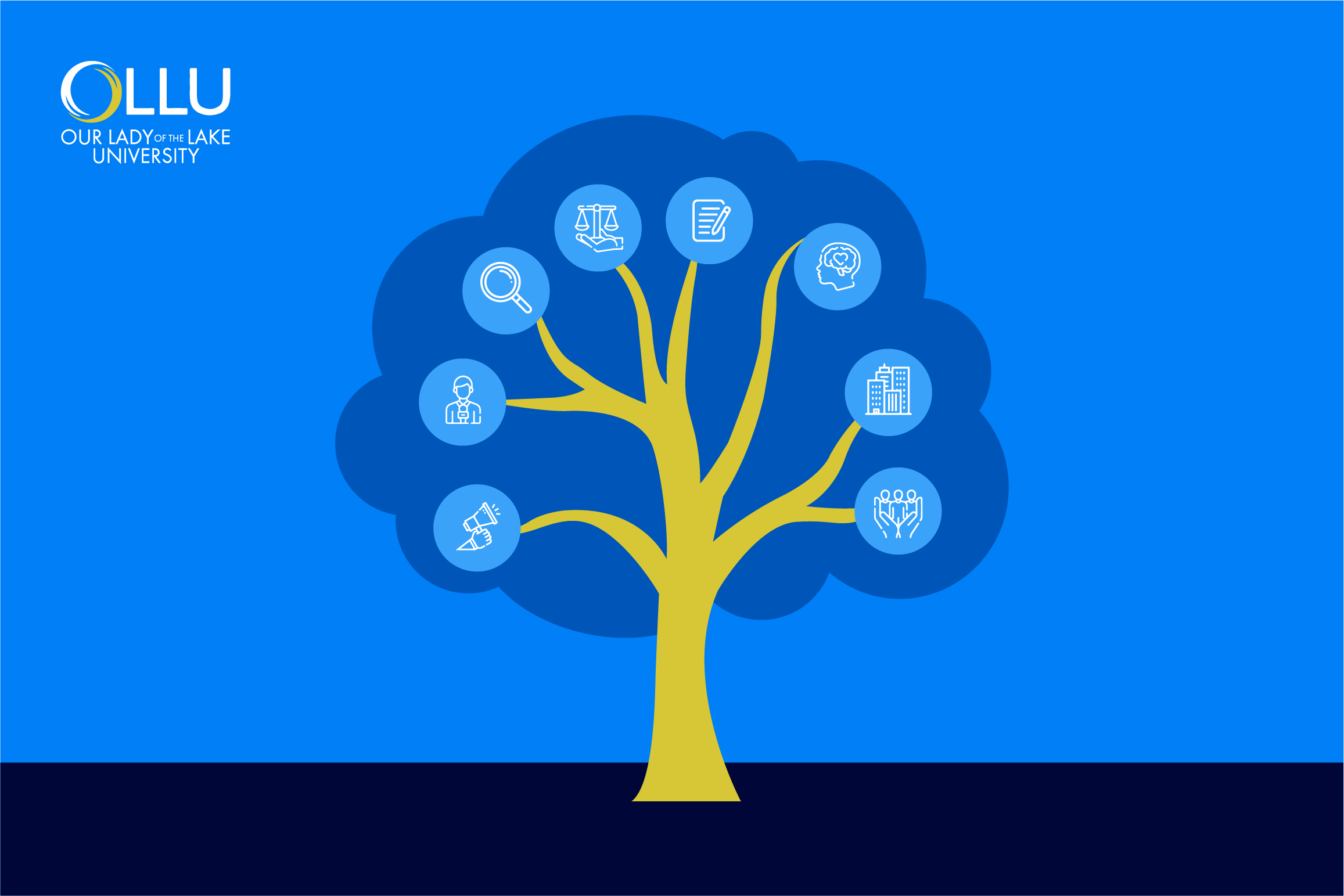Discover 8 Careers in Social Justice
Mar 06, 2024

Imagine a world where your career directly shapes a more just and equitable society,
where each day at work brings you closer to solving critical societal issues, and
where your professional skills and passions align seamlessly with the pursuit of fairness
and human dignity. Sounds intriguing? Then you’ve landed on the right page.
This blog dives into eight dynamic careers in social justice, each playing a pivotal role in forging a fairer world. From lawyers championing civil rights to social workers addressing systemic inequalities, these professions not only offer personal fulfillment but also contribute significantly to societal betterment. Join us as we explore these impactful careers, offering a glimpse into their day-to-day lives and the profound differences they make in our communities!
What Is Social Justice?
Social justice is justice that calls for equity. It represents the belief that all individuals within society deserve equal rights, opportunities, and privileges. Through the years, many movements in the U.S. and beyond have advocated for the fair treatment of all people. The goal was to guarantee people’s rights no matter their race, gender, sexual orientation, disability, or socioeconomic status.
Some of the most prominent examples of social justice in action include:
- The Civil Rights Movement (1950s - 1960s, USA): Led by figures like Martin Luther King Jr., Rosa Parks, and Malcolm X, this movement fought against racial segregation and discrimination in the United States, seeking equal rights for African Americans.
- Women's Suffrage Movements (late 19th - early 20th century, Global): Across different countries, these movements fought for women's right to vote.
- LGBTQ+ Rights Movements (late 20th century - present, Global): These movements advocate for the rights of lesbian, gay, bisexual, transgender, and queer individuals.
- The Black Lives Matter Movement (2013 - present, Global): Initiated as a response to Trayvon Martin's murderer, this movement campaigns against violence and systemic racism towards black people.
- Disability Rights Movement (1970s - present, Global): Advocates for the rights and inclusion of people with disabilities.
8 Careers in Social Justice
Besides through movements, there are other ways one can contribute to fair treatment for all. You can choose a career that aligns with the aims of social justice, further promoting and emphasizing its impact. In this following section, we will explore eight careers in social justice, detailing the national average salary, primary duties, and requirements for each. This crucial insight should serve as a guide toward making informed decisions and determining whether social justice work is the career for you.
Lawyer
Lawyers are pivotal in social justice, each type contributing uniquely. Human rights lawyers combat global injustices like trafficking and genocide. Public interest attorneys address societal issues, often for the underrepresented. Government lawyers, enforcing and interpreting laws, ensure justice within the legal framework. Immigration lawyers navigate complex statutes, aiding individuals in their pursuit of better lives. Civil rights attorneys fight against discrimination, safeguarding individual freedoms.
Their dynamic environment transcends traditional offices, spanning courtrooms, community centers, and sometimes international borders, reflecting the diverse nature of their cases. This variety demands adaptability and continuous learning. The job's demanding nature is notable, often exceeding a 40-hour week. Long hours are common, especially when preparing for court cases or meeting critical deadlines. Despite these challenges, their work is integral to upholding justice, balancing scales in society, and protecting individual rights and liberties.
National average salary: $146.016 per year
Policy Analyst
Policy analysts play a crucial role in shaping public policy and political events. They research extensively, examining current policies and assessing their impacts. By analyzing data, they identify issues and develop evidence-based recommendations. Their expertise in report drafting is essential, as these reports influence decision-making processes in governmental and non-governmental organizations.
Educationally, policy analysts usually hold degrees in political science, economics, or public administration. A bachelor's degree is fundamental, but a master's degree is often necessary, particularly for advanced positions. This higher education provides them with analytical tools, a deeper understanding of policy issues, and research skills crucial for their role.
The job of a policy analyst involves constant learning and adapting to new political, social, and economic developments. Their work directly impacts legislative changes and political strategies, making them key players in the ongoing dialogue of public policy development and reform.
National average salary: $93.759 per year
Grant Writer
Grant writers are instrumental in securing funding for organizations, primarily nonprofits and educational institutions. Their primary responsibility is to research and identify potential grant opportunities that align with their organization's goals and needs. This involves meticulously understanding the objectives and requirements of each element encompassing the grant.
Crucial to their role is the ability to adhere strictly to grant guidelines. They must craft compelling, clear, and concise proposals, often under tight deadlines. This requires excellent writing skills, attention to detail, and the ability to convey complex ideas effectively.
Moreover, grant writers must maintain a portfolio of relevant writing samples to demonstrate their proficiency and success in obtaining grants. Their expertise not only ensures financial support for their organizations but also enables the continuation and expansion of essential programs and services.
National average salary: $62,863 per year
Journalist
Journalists play a vital role in social justice, using investigative, watchdog, and online journalism to spotlight societal issues. They delve deep into complex topics, uncovering injustices and corruption through investigative reporting. This often involves rigorous research, interviewing key figures, and sifting through large amounts of data to reveal truths hidden from the public eye.
Watchdog journalism serves as a check on power, holding governments, corporations, and individuals accountable for their actions. It's instrumental in fostering transparency and preventing abuses of power.
Online journalism has widened this impact, allowing rapid dissemination of social justice stories to a global audience. Through digital platforms, journalists can engage directly with the public, inciting awareness and action.
Their work informs the public and sparks societal change, influencing policy and empowering marginalized communities.
National average salary: $78,080 per year
Victim Advocate

Victim advocates provide essential support to individuals affected by crimes. Their primary responsibility is to stand alongside victims, offering emotional support and guidance through the legal process. They are knowledgeable about resources like counseling services, legal assistance, and financial compensation, ensuring victims receive comprehensive care and information.
A bachelor’s degree in psychology, social work, or criminal justice is typically required, equipping advocates with foundational knowledge. Pursuing a master's degree in these fields can enhance their understanding and effectiveness. Additionally, volunteer experience, especially in crisis centers or similar environments, is invaluable, providing practical skills and empathy crucial for this role. Victim advocates are vital in helping individuals navigate their recovery journey with dignity and compassion.
National average salary: $53,568 per year
Social Worker
Social workers dedicate their careers to improving lives through counseling, advocacy, and resource provision. They address a wide range of issues, including poverty, abuse, addiction, and mental health, offering support to individuals, families, and communities. Their work often involves developing and implementing strategies to help clients cope with challenges, navigate social systems, and make positive changes in their lives.
The educational path to becoming a social worker starts with a bachelor's degree, typically in social work (BSW). Related fields like psychology or sociology are also common starting points. A BSW provides foundational knowledge in human behavior, social welfare policy, and ethics, coupled with practical experience through internships.
Many positions, especially in clinical settings, require a Master of Social Work (MSW). An MSW program delves deeper into clinical assessment and intervention strategies and often includes specialized training in areas like child welfare, mental health, or substance abuse. Licensure requirements, which vary by state, typically include an MSW and supervised clinical experience.
National average salary: $65,008 per year
Mental Health Technician
Mental health technicians play a crucial role in supporting clients during their recovery journey. They work under the supervision of mental health professionals, providing direct care to patients with mental illnesses or developmental disabilities. Duties include observing patient behavior, leading therapeutic activities, assisting with daily living tasks, and documenting patient progress.
A bachelor's degree in psychology, sociology, or a related field is commonly required, providing foundational knowledge in human behavior and mental health. Some regions may also mandate specific certifications, reflecting standardized competencies in mental health care.
These technicians are vital in creating a supportive environment, helping clients develop coping skills, and fostering progress toward recovery.
National average salary: $45,206 per year
Community Developer
A community developer, integral in uplifting marginalized groups, orchestrates innovative programs fostering inclusivity and empowerment. They typically hold a degree in social work, urban planning, or similar fields, blending academic knowledge with vital on-the-ground experience.
Their adeptness in project management is essential for implementing effective, sustainable initiatives. Their role demands educational grounding and a deep, empathetic understanding of diverse community dynamics.
By navigating social complexities, they create opportunities, bridge gaps, and drive transformative change, making their work both challenging and profoundly impactful in striving toward social equity.
National average salary: $56,997 per year
Should You Choose a Career in Social Justice?
Embracing a career in social justice offers not just a pathway to profound societal impact, but an avenue for deep personal fulfillment, encouraging you to be an agent of change in any field, whether through law, education, healthcare, or business, by integrating principles of equality, compassion, and fairness into your professional journey. The impact you can make is unimaginable!
Consider weaving the principles of social justice into the fabric of any career, embracing the opportunity to foster equality and understanding across diverse fields, from technology to the arts, and transforming every profession into a platform for positive, ethical change.
The Bottom Line
The realm of social justice offers a diverse array of career paths, each with its unique impact and opportunities for meaningful change. Whether you’re drawn to law, education, community development, or another field, there’s a place for your passion and skills. Remember, the pursuit of social justice is not confined to specific roles; it's a principle that can be integrated into any career. Explore these eight careers as a starting point and consider how you can contribute to a fairer, more equitable world!
Frequently Asked Questions (FAQs):
What are the 5 points of social justice?
The five points of social justice are equity, access, participation, diversity, and human rights. These principles aim to ensure fair treatment, equal opportunities, and respect for all individuals in society.
What do you do in social justice?
In social justice, one advocates for and works towards eliminating societal inequalities and injustices. This involves activities such as policy development, community organizing, and legal representation to protect and promote the rights of marginalized groups.
What degree is good for social justice?
Degrees beneficial for a career in social justice include Social Work, Sociology, Political Science, Law, and Public Administration. These disciplines provide the knowledge and skills necessary to understand, advocate for, and implement social justice initiatives.